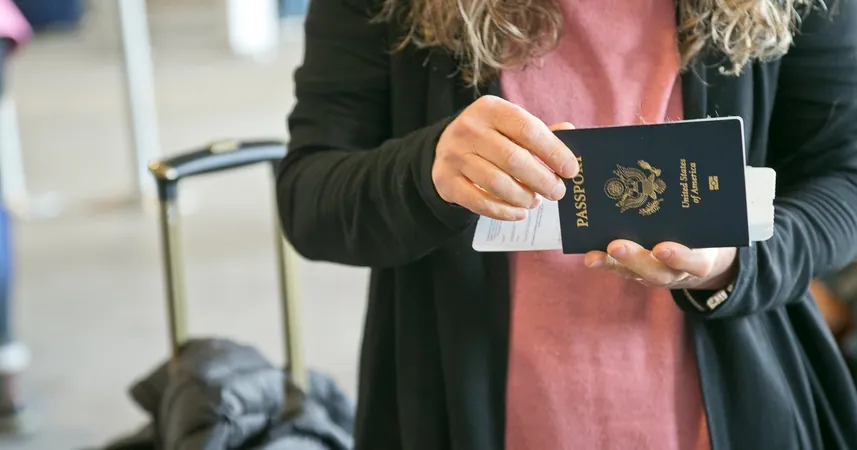
Navigating the Global Travel Dilemma: Americans Confront a New Reality Post-Election
2025-08-24
Author: Ming
International travel has always meant answering the simple question, "Where are you from?" For years, Americans could respond with pride, but the political landscape has dramatically influenced this seemingly harmless exchange.
Since last November's election, the atmosphere has shifted. Many Americans traveling abroad have found that their response to this question now comes wrapped in fear and self-awareness. One traveler recounts how, during visits to places like the UAE, India, and Iceland, they felt compelled to whisper their nationality, almost ashamed of being associated with the U.S. under its current leadership.
This unease deepened as the traveler's trips unfolded. By the time they reached India, they added, "But I didn’t vote for him!" as a disclaimer, only to be met with mixed reactions ranging from understanding to discomfort.
In Iceland—a nation celebrated for its inclusivity and vibrant culture—the traveler felt even more conflicted. The contrast between Iceland's strong values of diversity and Trump's divisive rhetoric was palpable. To avoid surfacing uncomfortable political topics, they even altered their identity, claiming Polish roots, despite their limited connection to the country.
After grappling with the discomfort throughout the journey, the traveler felt a blend of embarrassment and disbelief, where they arrived at the crux of the issue: even though it seems trivial, answering where you’re from today carries heavy baggage.
The Broader Experience: You're Not Alone
They're not alone in facing this dilemma. A quick online search reveals countless discussions on Reddit and other platforms where travelers share similar worries. The unease of discussing one's origins isn’t purely about the politics at play; it can stem from concerns for safety or personal privacy as well.
To Disclose or Not to Disclose: The Expert Opinions
Experts advise that honesty is generally the best approach. Though the temptation to claim Canadian citizenship may arise, travel author Erin Zhurkin emphasizes that this only compounds the negative perception of Americans. Lying could lead to awkward moments or discovery, worsening the situation.
Instead, many travelers have found comfort in discussing the state they’re from, prompting geographical inquiries rather than political discourse. However, if safety is at risk, some may choose to hide their American identity altogether.
Navigating Political Conversations Abroad
When it comes to political discussions, etiquette experts recommend having neutral responses prepared, like "It’s complicated" or "Every country has its issues." Such tactics allow travelers to steer the conversation away from contentious political terrain while remaining amicable.
Participants in the global conversation might even discover surprising support for American policies abroad, flipping the script on assumptions they've held about international perceptions.
Using Humor to Diffuse Tension
The skill of deflecting uncomfortable discussions is invaluable. Many travelers have employed humor when disclosing their nationality, using statements like, "The people have spoken, but I'm not one of them!" This approach can break the ice and show solidarity toward more pressing human experiences, allowing for a richer dialogue.
Finding Common Ground
Ultimately, many agree that focusing on culture and personal interactions is key to international travel. By sharing a passion for local cuisine or sightseeing adventures, travelers can immerse themselves in the present, reducing the weight of their national identity.
So next time you’re abroad and asked where you're from, consider these strategies to foster genuine connections—while preserving your own comfort and safety.
 Brasil (PT)
Brasil (PT)
 Canada (EN)
Canada (EN)
 Chile (ES)
Chile (ES)
 Česko (CS)
Česko (CS)
 대한민국 (KO)
대한민국 (KO)
 España (ES)
España (ES)
 France (FR)
France (FR)
 Hong Kong (EN)
Hong Kong (EN)
 Italia (IT)
Italia (IT)
 日本 (JA)
日本 (JA)
 Magyarország (HU)
Magyarország (HU)
 Norge (NO)
Norge (NO)
 Polska (PL)
Polska (PL)
 Schweiz (DE)
Schweiz (DE)
 Singapore (EN)
Singapore (EN)
 Sverige (SV)
Sverige (SV)
 Suomi (FI)
Suomi (FI)
 Türkiye (TR)
Türkiye (TR)
 الإمارات العربية المتحدة (AR)
الإمارات العربية المتحدة (AR)